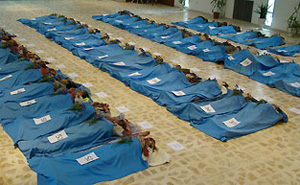 AP: Iraqi authorities are planning to relocate the remaining residents of a camp housing dozens of Iranian exiles where 52 people were killed last week, the United Nations mission to the country said Saturday.
AP: Iraqi authorities are planning to relocate the remaining residents of a camp housing dozens of Iranian exiles where 52 people were killed last week, the United Nations mission to the country said Saturday.
The Associated Press
By ADAM SCHRECK
 BAGHDAD (AP) — Iraqi authorities are planning to relocate the remaining residents of a camp housing dozens of Iranian exiles where 52 people were killed last week, the United Nations mission to the country said Saturday.
BAGHDAD (AP) — Iraqi authorities are planning to relocate the remaining residents of a camp housing dozens of Iranian exiles where 52 people were killed last week, the United Nations mission to the country said Saturday.
The eviction could prove contentious. The Shiite-led Iraqi government long has wanted to remove the Mujahedeen-e-Khalq dissident group from Camp Ashraf, a Saddam Hussein-era compound about 95 kilometers (60 miles) northeast of the Iraqi capital, but the exiles have been extremely reluctant to leave. Baghdad considers their presence inside Iraq illegal.
Thousands of camp residents relocated to a Baghdad-area facility on what is meant to be a temporary basis last year following months of negotiations.
A core of about 100 MEK members stayed behind, 52 of whom were killed in shootings Sunday that the group blames on Iraqi security forces. Another seven people are missing and are believed to be detained, according to the MEK. Iraqi officials contend that an internal dispute was to blame.
The U.N. mission to Iraq said Saturday that Iraqi authorities have ordered the remaining residents from Camp Ashraf to be moved to the Baghdad-area facility, a former U.S. military base known as Camp Liberty. Iraqi officials are expected to carry out the order “without delay,” according to the U.N.
Deputy U.N. envoy Gyorgy Busztin called on both sides to exercise restraint to avoid any violence during the relocation. He said the U.N. is ready to monitor the process.
“We strongly hope all parties will act responsibly and that the process of relocation to Camp Hurriya will be peaceful and voluntary,” Busztin said.
Ali al-Moussawi, the spokesman for Iraqi Prime Minister Nouri al-Maliki, confirmed that an order has been issued to evict the residents. He declined to say when the transfer would take place, but said the government insists it happen “as soon as possible.”
The MEK opposes Iran’s clerical leadership. It carried out a series of bombings and assassinations inside Iran in the 1980s and fought alongside Iraqi forces in the 1980-88 Iran-Iraq war. Saddam granted several thousand of its members sanctuary inside Iraq.
The MEK’s continued presence inside Iraq long has irritated Iraq’s postwar leadership, which has worked to bolster ties with neighboring Shiite powerhouse Iran. The government is highly suspicious of those linked to the former regime.
The group says it renounced violence in 2001 and camp residents were disarmed by U.S. troops after the invasion. The U.S. considered the MEK a terrorist group until last year, and cooperation in leaving Camp Ashraf was a key factor in reversing that designation.
Shahriar Kia, a spokesman for the MEK residents, said in a statement that the Iraqi government is planning to “massacre” the remaining residents and called on the U.S. government to intervene.
A spokeswoman for the U.S. State Department, Marie Harf, said in a statement Friday that Washington is following the situation at Camp Ashraf and condemns Sunday’s violence while expressing support for U.N. fact-finding efforts. She urged all sides to cooperate with efforts to relocate the residents to Camp Liberty.
Camp Liberty is meant to be a temporary way station for the exiles while the U.N. works to resettle them abroad. MEK supporters have complained about services and security at the compound, which has been repeatedly targeted by militants in deadly rocket attacks. It houses more than 2,800 exiles, according to U.N. figures.
Efforts to resettle the exiles outside Iraq has been slow because the U.N. has had difficulty securing commitments from member states to accept them and because some of them are reluctant to be separated from their comrades. They do not want to return to Iran because they fear persecution there.
A total of 198 former residents of the two camps have been resettled abroad so far, most to Albania.
—
Associated Press writer Qassim Abdul-Zahra contributed to this report.


